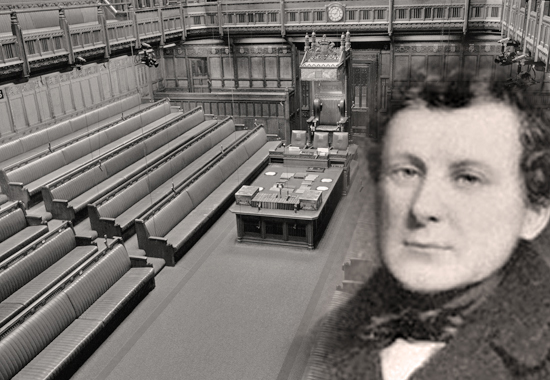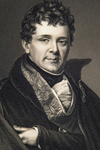|

DANIEL O'CONNELL AND THE HOUSE OF
COMMONS
Justice for Ireland
Go here for more about
 Daniel O'Connell.
Daniel O'Connell.
Go here for more about
 Justice for Ireland speech.
Justice for Ireland speech.
It follows the full text transcript of
Daniel O'Connell's Justice for Ireland speech, delivered
in the House of Commons, London, United Kingdom - February
4, 1836.

 |
It appears to me
impossible to suppose that the House will
consider me presumptuous in wishing to be heard
for a short time on this question, especially
after the distinct manner in which I have been
alluded to in the course of the debate. |
If I had no other
excuse, that would be sufficient; but I do not
want it. I have another and a better, the
question is one in the highest degree
interesting to the people of Ireland.
It is, whether we
mean to do justice to that country, whether we
mean to continue the injustice which has been
already done to it, or to hold out the hope that
it will be treated in the same manner as England
and Scotland. That is the question.
We know what lip
service is. We do not want that. There are some
men who will even declare that they are willing
to refuse justice to Ireland; while there are
others who, though they are ashamed to say so,
are ready to consummate the iniquity, and they
do so.
England never did
do justice to Ireland, she never did. What we
have got of it we have extorted from men opposed
to us on principle, against which principle they
have made us such concessions as we have
obtained from them.
The right
honorable baronet opposite [Sir Robert Peel]
says he does not distinctly understand what is
meant by a principle. I believe him. He
advocated religious exclusion on religious
motives. He yielded that point at length, when
we were strong enough to make it prudent for him
to do so.
Here am I calling
for justice to Ireland. But there is a coalition
tonight, not a base unprincipled one, God
forbid! It is an extremely natural one. I mean
that between the right honorable baronet and the
noble lord the member for North Lancashire [Lord
Stanley]. It is a natural coalition, and it is
impromptu, for the noble lord informs us he had
not even a notion of taking the part he has
until the moment at which he seated himself
where he now is.
I know his candor.
He told us it was a sudden inspiration which
induced him to take part against Ireland. I
believe it with the most potent faith, because I
know that he requires no preparation for voting
against the interests of the Irish people.
[Groans.] I thank you for that groan, it is just
of a piece with the rest.
I regret much that
I have been thrown upon arguing this particular
question, because I should have liked to have
dwelt upon the speech which has been so
graciously delivered from the throne today, to
have gone into its details, and to have pointed
out the many great and beneficial alterations
and amendments in our existing institutions
which it hints at and recommends to the House.
The speech of last
year was full of reforms in words, and in words
only. But this speech contains the great leading
features of all the salutary reforms the country
wants, and if they are worked out fairly and
honestly in detail, I am convinced the country
will require no further amelioration of its
institutions, and that it will become the envy
and admiration of the world. I, therefore, hail
the speech with great satisfaction.
It has been observed that the object of a king's
speech is to say as little in as many words as
possible. But this speech contains more things
than words. It contains those great principles
which, adopted in practice, will be most
salutary not only to the British Empire, but to
the world.
When speaking of
our foreign policy, it rejoices in the
cooperation between France and this country. But
it abstains from conveying any ministerial
approbation of alterations in the domestic laws
of that country which aim at the suppression of
public liberty, and the checking of public
discussion, such as a call for individual
reprobation, and which I reprobate as much as
any one.
I should like to
know whether there is a statesman in the country
who will get up in this House and avow his
approval of such proceedings on the part of the
French government. I know it may be done out of
the House amid the cheers of an assembly of
friends. But the government have, in my opinion,
wisely abstained from reprobating such measures
in the speech, while they have properly exulted
in such a union of the two countries as will
contribute to the national independence and the
public liberty of Europe.
Years are coming over me, but my heart is as
young and as ready as ever in the service of my
country, of which I glory in being the
pensionary and the hired advocate. I stand in a
situation in which no man ever stood yet. The
faithful friend of my country, its servant, its
stave, if you will, I speak its sentiments by
turns to you and to itself.
I require no
£
2o,ooo,ooo on
behalf of Ireland. I ask you only for justice.
Will you, can you, I will not say dare you,
refuse, because that would make you turn the
other way. I implore you, as English gentlemen,
to take this matter into consideration now,
because you never had such an opportunity of
conciliating.
Experience makes
fools wise. You are not fools, but you have yet
to be convinced. I cannot forget the year 1825.
We begged then as we would for a beggar's boon.
We asked for emancipation by all that is sacred
amongst us, and I remember how my speech and
person were treated on the Treasury Bench, when
I had no opportunity of reply.
The other place
turned us out and sent us back again, but we
showed that justice was with us. The noble lord
says the other place has declared the same
sentiments with himself, but he could not use a
worse argument. It is the very reason why we
should acquiesce in the measure of reform, for
we have no hope from that House. All our hopes
are centered in this, and I am the living
representative of those hopes.
I have no other
reason for adhering to the ministry than because
they, the chosen representatives of the people
of England, are anxiously determined to give the
same measure of reform to Ireland as that which
England has received. I have not fatigued
myself, but the House, in coming forward upon
this occasion.
I may be laughed
and sneered at by those who talk of my power,
but what has created it but the injustice that
has been done in Ireland? That is the end and
the means of the magic, if you please, the
groundwork of my influence in Ireland.
If you refuse
justice to that country, it is a melancholy
consideration to me to think that you are adding
substantially to that power and influence, while
you are wounding my country to its very heart's
core; weakening that throne, the monarch who
sits upon which, you say you respect; severing
that union which, you say, is bound together by
the tightest links, and withholding that justice
from Ireland which she will not cease to seek
till it is obtained; every man must admit that
the course I am taking is the legitimate and
proper course. I defy any man to say it is not.
Condemn me
elsewhere as much as you please, but this you
must admit. You may taunt the ministry with
having coalesced me, you may raise the vulgar
cry of "Irishman and Papist" against me, you may
send out men called ministers of God to slander
and calumniate me. They may assume whatever garb
they please, but the question comes into this
narrow compass.
I demand, I
respectfully insist, on equal justice for
Ireland, on the same principle by which it has
been administered to Scotland and England. I
will not take less. Refuse me that if you can.

More History
|